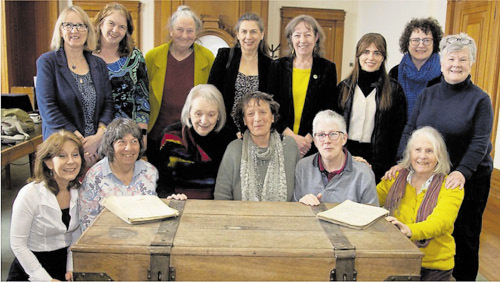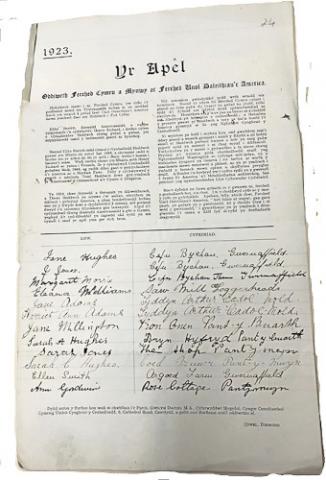
Imagine setting out today, in 2024, to launch a petition, inviting all women over the age of 18 living in Wales to sign. Then, imagine succeeding in gathering 390,296 signatures. Then, imagine a war-less world and a world free from the trafficking of women and children, drugs and weapons.
All wonders difficult to imagine. But without the imagining, such ideals can never be realised. This is the kind of imagining that comes from hope – if we understand hope, not as sitting back, fingers crossed, but rather as letting an energy plant an ideal in our mind and then letting that same energy show us the way to reach the ideal.
This energy of hope is exactly what inspired the women of Wales a century ago to do their part to bring about a world without war.
Scarred by the First World War, which killed over 40,000 citizens of Wales alone, the establishment of an alliance or league between the nations offered the possibility of ensuring that future disputes between states would be resolved around the table rather than becoming more entangled on the battlefield.
This notion of a League of Nations took root in Wales where a Welsh Union of the League was enthusiastically established.
There was, however, one weakness in the fabric of this new international alliance. Until every nation had joined it, there was little hope of it being effective.
One conspicuously absent country was the United States of America.
Sister-to-sister
So it was decided that a dialogue should be opened, one that talked sister-to-sister, not politician-to-politician, and that the women of Wales should appeal directly to the women of the US to do everything in their power to persuade the authorities of their vast country to come to the League of Nations’ table.
Having launched ‘The Appeal’, as the petition was known, in one of the university buildings in Aberystwyth in May 1923, work began on realising the vision.
In an age without fax or Facebook, without email, with hardly any cars or telephones there was nothing for it but to walk the length and breadth of the country, tirelessly knocking on the door of every household in Wales.
Through a network of 400 organisers and after many trials and tribulations, it was finally decided that Mary Ellis should sail to the US in December 1923 to prepare the way for the delegation.
After all, it was imperative to ensure that the oak chest designed to hold the precious cargo of signatures and their message should receive the attention they deserved.
Mary Ellis was a remarkable woman, one of only two female school inspectors (his majesty’s inspectors or HMIs) in Wales at the time.
The other two members of the trinity of peace envoys were Elined Prys, a brilliant young philosopher who had volunteered with refugees in Romania, and Annie Jane Hughes Griffiths, daughter of Cwrt Mawr, Llangeitho, charismatic leader, supporter of all things learning and culture, widow of TE Ellis, MP, and wife of Peter Hughes Griffiths, minister of the Welsh chapel in Charing Cross Road, London.
These three were accompanied by Gladys Thomas, also one of the London Welsh.
The story about them reaching New York and the grand reception at the Biltmore Hotel inspires awe even today.
This was the start of a full-on schedule that saw them addressing women’s groups across the US. They also met with a few men – the most prominent of them being the president himself, Calvin Coolidge, who welcomed them to the White House.
It’s impossible to relate their tour in full or to do justice to its ambition and scale here, and I would urge Peace News readers to read the bilingual book that chronicles the history in more detail: Yr Apêl / The Appeal.

Photo: Women’s Peace Petition Partnership
Uncovering hidden history
While some of you may by now have heard something of the remarkable petition, I can be sure that almost nobody was familiar with the story until the current campaign to uncover its hidden history began in this, its centenary, year.
Thanks to the endurance of the Heddwch Nain / Mam-gu (Our Grandmother’s Peace) Group and to the collaboration between a number of key organisations in Wales, as well as the generosity of the Smithsonian Institution in Washington DC, we have now managed to bring the chest and its signatures back to Wales.
“Should we not revisit the underlying ideals of such campaigns until, one day, they do succeed?”
It is being digitised and placed on the web so that everyone, world over, can browse the names and be inspired by their determination.
Why did the story go missing? It’s difficult to know. Perhaps the combination of women activists on the one hand, and of acting in the name of peace on the other, carries too much potential to challenge the status quo. Or maybe because the initiative did not succeed.
After all, the US did not join the League of Nations and, soon after, a second war did come to tear the world apart.
And yet, is it not imperative to remember and celebrate unsuccessful campaigns too, especially if their aims were commendable? Should we not revisit the underlying ideals of such campaigns until, one day, they do succeed?
That is certainly the opinion of Hawlio Heddwch, the Peace Petition Partnership, which has come together under the auspices of Academi Heddwch Cymru (the Wales Peace Institute) to disseminate the story as widely as possible. We believe that we can be inspired anew by the ambition of the original women. Their words are as relevant today as they were a hundred years ago.
As we read them, let’s imagine. And let’s set out to realise their vision:
‘The future is big with hope if we, as the women of this generation, do our part. To us has come an opportunity as real as the responsibility is grave. We would, therefore, appeal to you… to aid in the effort to hand down to the generations which come after us, the proud heritage of a warless world.’

